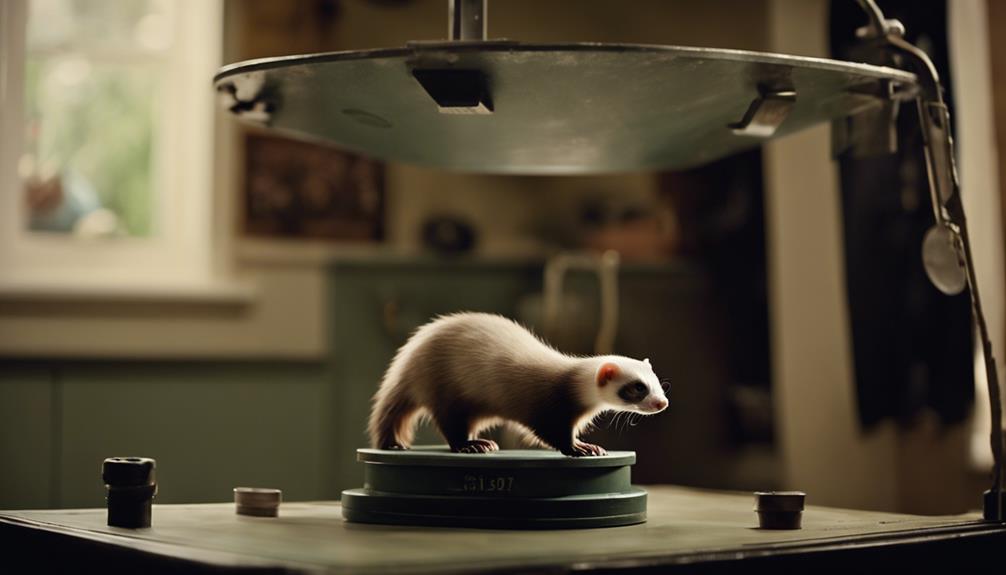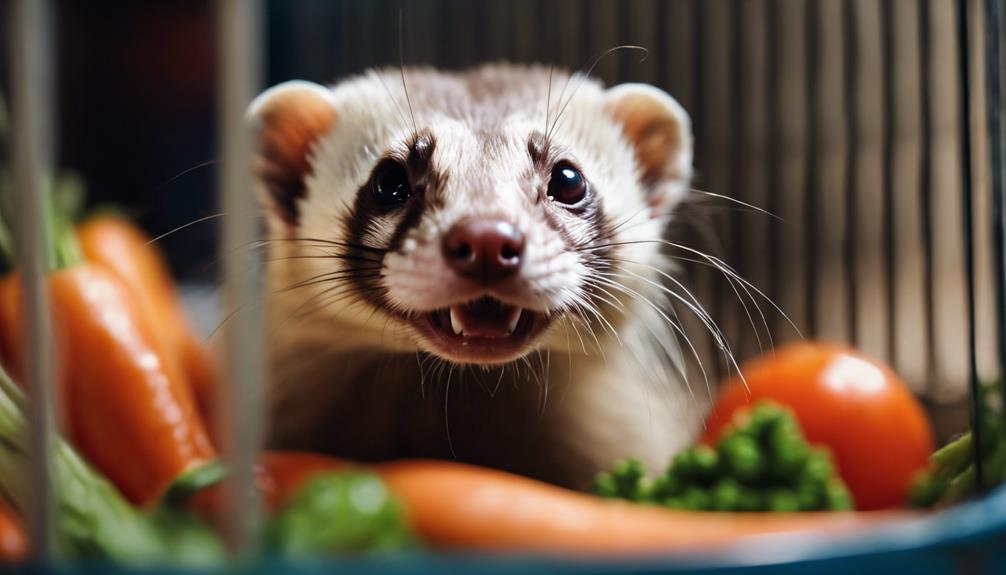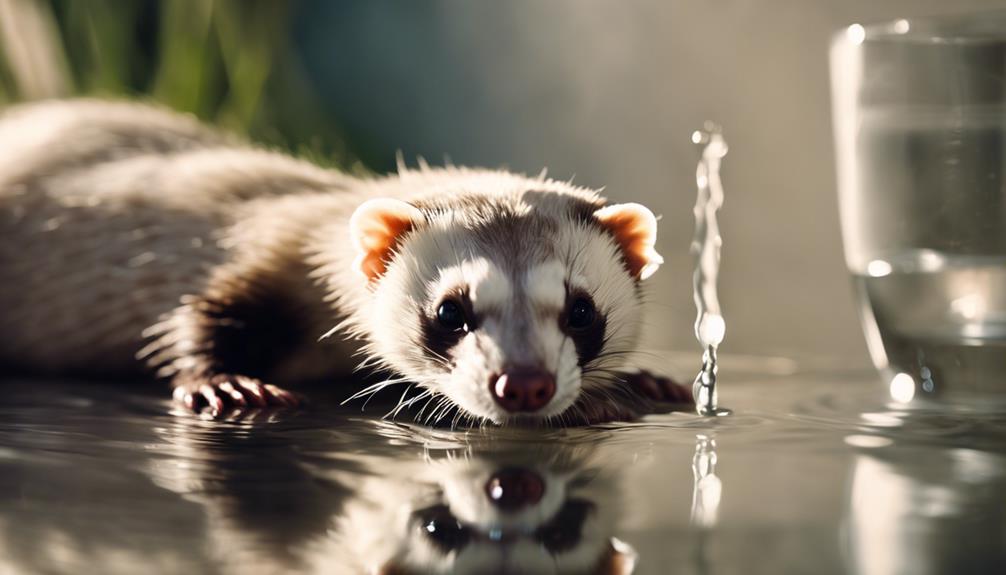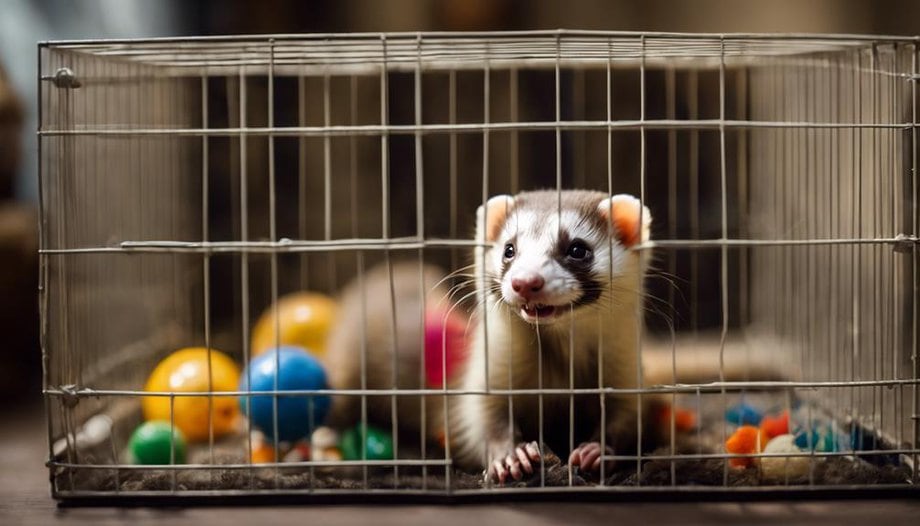How to Monitor Your Ferret's Health After Dietary Changes

How to Monitor Your Ferret's Health After Dietary Changes:
Pay attention to subtle cues and behaviors to assess the impact on their well-being.
Look out for signs of digestive issues and changes in energy levels for insights into their overall health.
Signs of Digestive Issues
When monitoring a ferret's health after dietary changes, it's crucial to be vigilant for any signs of digestive issues that may arise. Observing the ferret's stool consistency is essential as changes could indicate digestive distress. Loose stools or diarrhea may suggest that the new diet isn't agreeing with the ferret's digestive system. Additionally, ensuring adequate hydration levels is vital for overall digestive health. Ferrets should have access to fresh water at all times, especially after dietary modifications, to prevent dehydration that can exacerbate digestive issues.
In addition to stool consistency and hydration levels, monitoring appetite changes is crucial. A sudden decrease or increase in appetite could signal underlying digestive problems that need attention. Furthermore, alterations in grooming habits, such as decreased grooming or a lack of interest in self-care, may indicate discomfort or digestive disturbances. By staying alert to these signs of digestive issues, ferret owners can promptly address any concerns and ensure their pet's well-being.
Weight Changes to Watch For

Monitoring your ferret's weight for changes is essential to track their health status accurately and ensure they're maintaining a healthy body condition. Weight fluctuations can indicate underlying health issues or the effectiveness of dietary adjustments and exercise routines. Ferrets should have consistent weight maintenance, barring any intentional weight changes due to health recommendations.
Sudden weight loss could be a sign of dehydration or malnutrition, while unexplained weight gain might suggest overfeeding or an underlying health condition. Regularly weighing your ferret and keeping track of these measurements can help you detect any concerning trends early on. Additionally, monitoring hydration levels alongside weight changes is crucial, as dehydration can impact weight and overall health.
If you notice significant or persistent weight fluctuations in your ferret, consult a veterinarian promptly to address any potential health concerns and ensure your furry friend receives the appropriate care.
Fur and Skin Condition

Maintaining a close eye on your ferret's fur and skin condition is crucial for assessing their overall health and well-being. A healthy ferret should have a shiny coat with a smooth texture. Dry and brittle fur could indicate dehydration or nutritional deficiencies.
To check for hydration levels, gently pinch the skin on the back of your ferret's neck; if it snaps back into place immediately, their skin elasticity is good. However, if the skin takes longer to return to its normal position, it may suggest dehydration. In such cases, providing fresh water and consulting a veterinarian is advisable.
Additionally, monitor your ferret for any bald patches, redness, or flaky skin, which could signal underlying health issues. Regular grooming sessions not only help maintain coat texture but also provide an opportunity to inspect your ferret's skin closely.
Energy and Activity Levels

It's essential to observe your ferret's energy levels after making dietary changes as they can provide valuable insights into your pet's well-being.
Changes in activity levels can serve as indicators of how well your ferret is adjusting to the new diet.
Consistently monitoring these changes can help you identify any potential issues early on and take appropriate action.
Energy Levels After Changes
After dietary changes, ferret owners may notice a shift in their pet's energy levels and activity patterns. It's common for ferrets to exhibit changes in their playtime routines and sleep patterns following alterations in their diet. Owners should observe whether their ferret appears more or less active than usual.
Increased energy levels could indicate a positive response to the new diet, while decreased activity might signify a need for further evaluation. Monitoring playtime routines can help assess the overall well-being of the ferret. Similarly, changes in sleep patterns, such as increased or decreased restlessness, could provide valuable insights into their health post-dietary changes.
Tracking these energy and activity levels will aid in gauging the impact of dietary adjustments on the ferret's overall health.
Activity Level Indicators
Observing the energy and activity levels of your ferret can provide valuable insights into their health status following dietary changes. To monitor these indicators effectively, consider the following:
- Sleep Patterns: Changes in your ferret's sleep patterns can indicate stress or discomfort. Ensure they've a quiet, comfortable space to rest undisturbed.
- Playtime: Encouraging regular play sessions can help assess your ferret's energy levels and overall mood. A decrease in playfulness might signal health issues.
- Appetite and Hydration Levels: Monitor your ferret's food and water intake closely. Changes in appetite or hydration levels can be early signs of health problems that need attention.
Stay vigilant in observing these activity level indicators to ensure your ferret remains healthy and happy.
Monitoring Changes Consistently
How can you consistently monitor changes in your ferret's energy and activity levels following dietary adjustments?
Daily observations are key to tracking your ferret's progress effectively. By incorporating regular check-ins, you can monitor how your ferret's energy levels fluctuate throughout the day. Note any changes in their activity levels, such as increased playfulness or lethargy, to gauge their response to the new diet.
Consistency in tracking these observations will help you identify any patterns or trends over time. It's essential to establish a routine for monitoring progress, ensuring that any shifts in energy and activity levels are promptly noted and addressed.
Water Consumption

Ferret owners should closely monitor their pet's water intake to ensure they're adequately hydrated. Any sudden changes in water consumption should be noted and investigated promptly.
Providing fresh water daily is essential to maintaining your ferret's health and well-being.
Monitor Water Intake
To ensure your ferret's health remains optimal, closely monitoring its water intake is crucial after making any dietary changes. Proper hydration is essential for your ferret's well-being, so pay attention to the following:
- Water bowl placement: Ensure the water bowl is easily accessible to your ferret, placed in a quiet area away from its litter box and food bowl to encourage drinking.
- Hydration habits: Monitor your ferret's daily water consumption to ensure it's drinking enough. Ferrets should typically drink around 50-100 ml of water per day, but this can vary based on size, diet, and activity level.
- Behavioral changes: Watch out for any signs of increased or decreased water intake, as sudden changes could indicate an underlying health issue.
Look for Changes
After ensuring the water bowl is easily accessible and monitoring your ferret's daily water consumption, it's essential to look for any changes in its water intake as a potential indicator of health issues.
Observing behavior changes and fluctuations in energy levels can signal underlying problems. A sudden increase or decrease in water consumption may indicate issues such as diabetes, kidney disease, or dehydration. Additionally, monitoring weight fluctuations and hydration levels is crucial.
Ferrets should have consistent energy levels and maintain a healthy weight. Any significant deviations from their normal patterns should be promptly addressed by a veterinarian. By staying vigilant and noting any changes in your ferret's water intake and overall well-being, you can ensure early detection and proper management of potential health concerns.
Provide Fresh Water
Providing fresh water regularly is crucial to ensure optimal water consumption and hydration for your ferret's health. When monitoring your ferret's water intake, consider the following:
- Water Quality: Ensure the water provided is clean and fresh to promote healthy hydration levels.
- Hydration Levels: Monitor your ferret's drinking habits to ensure they're adequately hydrated, as dehydration can lead to various health issues.
- Water Retention: Keep an eye on any changes in your ferret's water retention, as sudden fluctuations may indicate underlying health concerns.
Litter Box Observations

Observing your ferret's litter box habits is crucial for monitoring its health after dietary changes. Regularly checking the litter box can provide valuable insights into your ferret's digestive health. Here is a simple table to help you track your ferret's litter box habits effectively:
| Aspect | What to Look For | Action |
|---|---|---|
| Frequency | Changes in frequency of use | Consult a vet if there are sudden deviations. |
| Consistency | Differences in stool texture | Adjust diet if stools are consistently loose. |
| Odor | Strong, unusual smells | Monitor closely for signs of digestive issues. |
| Presence of Urine | Amount and color of urine | Ensure ferret stays hydrated, seek help if needed. |
| Changes in Behavior | Avoiding or struggling in the litter box | Address potential litter training issues. |
Behavioral Changes

Regularly monitoring your ferret's behavior is essential for detecting any potential changes that may indicate underlying health issues following dietary adjustments. Behavioral observations play a crucial role in understanding your ferret's well-being.
Here are some key points to consider when observing your ferret's behavior after diet adjustments:
- Increased Aggression: Watch out for any signs of increased aggression towards humans or other pets. This could indicate stress or discomfort due to dietary changes.
- Decreased Activity Levels: A decrease in your ferret's usual activity levels may suggest that the new diet isn't providing adequate energy. It could also be a sign of underlying health issues that need attention.
- Unusual Litter Box Habits: Changes in litter box habits, such as increased frequency or accidents outside the litter box, could be linked to behavioral modifications resulting from diet adjustments.
Frequently Asked Questions
Can Dietary Changes Lead to Changes in a Ferret's Dental Health?
Changes in a ferret's diet can impact dental health. Studies suggest that improper diet may contribute to dental issues in ferrets. Monitoring dental care and addressing any digestive issues that arise after dietary changes is crucial.
How Often Should a Ferret's Nails Be Trimmed After Dietary Changes?
Regularly trim a ferret's nails every 2-4 weeks after dietary changes. Pay attention to coat condition, behavior changes, weight management, and digestive issues. This routine grooming promotes comfort and prevents issues related to overgrown nails.
Are There Specific Supplements or Vitamins That Should Be Added to a Ferret's Diet After Making Changes?
Ferrets have specific nutritional requirements that may need to be adjusted based on dietary changes. Supplements such as taurine and omega-3 fatty acids can support their health. However, introducing new vitamins should be done cautiously to avoid digestive issues.
Can Dietary Changes Affect a Ferret's Reproductive Health?
Dietary changes can impact a ferret's hormonal regulation and reproductive health. It's crucial to observe signs of reproductive issues like abnormal heat cycles or enlarged mammary glands. A vet should assess any concerns promptly.
How Long Should It Take for a Ferret to Adjust to New Food After a Dietary Change?
Ever wondered how long it takes for a ferret to adjust to new food after a dietary change? Well, behavior changes, weight fluctuations, digestive issues, and skin problems may vary in response time based on individual factors.











